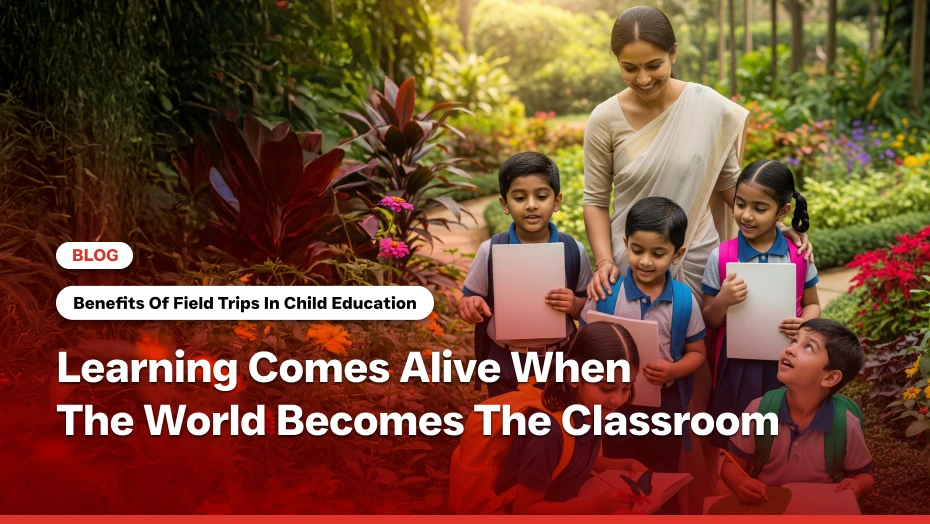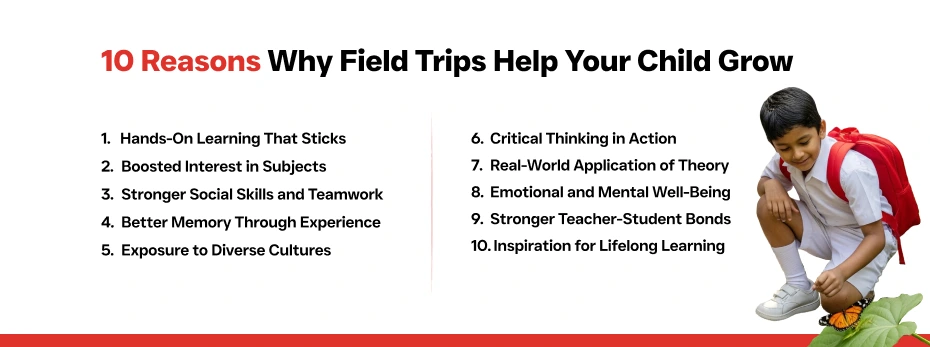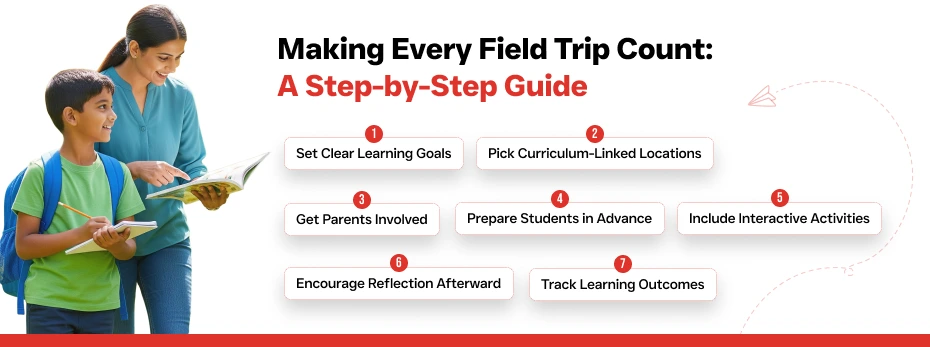Benefits of Field Trips in Child Education

From textbooks and chalkboards, classrooms have evolved significantly. More educational institutions are now recognizing the value of learning outside of the classroom. Children’s perspectives on the world around them need to change, and outdoor education is more than just a fad. An essential component of this change is field trips. They give lessons on life and transform theory into practice.
When your child steps out of the classroom and into a museum, a forest, or a community event, something changes. Learning becomes real. These moments build stronger understanding, deeper curiosity, and practical skills that can’t always be taught through books. The benefits of field trips in child education go far beyond a fun day out. They help shape confident, aware, and socially skilled individuals.
Understanding About Field Trips in Education
Field trips in education are planned educational journeys that take students outside their usual classroom environment. These can be visits to museums, science centers, factories, farms, nature parks, or even art galleries. What makes them special is how they connect classroom learning to real-world experiences.
Instead of just reading about history, students can stand where it happened. Instead of watching a science experiment on screen, they can see it unfold in a lab or nature reserve.
Children who receive this type of hands-on experience are better able to retain and comprehend concepts.
Among the various types of field trips are:
- Educational Tours: Visits to science institutes, museums, and historical places.
- Nature excursions: These include trips to botanical gardens, parks, and beaches.
- Industry Visits: Acquiring knowledge about factories, farms, or enterprises.
- Adventure Trips: Retreats for team-building, hiking, or camping.
Each type serves a unique purpose in a child’s learning journey and contributes to their growth.
Importance of Field Trips for Students

Field trips are essential tools that enhance the overall educational experience. They provide outdoor education that goes hand-in-hand with classroom teaching. These trips are not about escaping schoolwork; they’re about enriching it.
When students see real-world examples of what they’ve learned in class, the knowledge sticks. Suddenly, math, science, literature, and social studies don’t feel like isolated subjects. They become part of life.
Let’s explore why field trips are important for students and how they contribute to personal and academic growth.
1. Hands-On Learning
Children absorb more when they touch, feel, and experience something. Seeing animals in a zoo or interacting with an artist in a gallery creates stronger memories than just reading about them. This kind of learning is more effective because it involves all the senses.
2. Increases Interest and Engagement
The monotony is broken with field trips, and curiosity is sparked by unfamiliar surroundings. Observing a blacksmith in action or getting a close-up look at aquatic life are examples of experiences that spark interest in otherwise uninteresting topics.
3. Develops Social Skills and Teamwork
Children learn to share space, follow group instructions, and collaborate with classmates. Simple activities like walking in pairs or participating in a group task teach valuable social skills and encourage teamwork.
4. Supports Memory Retention
Because field trips are emotionally and physically engaging, they stay longer in memory. This makes it easier for children to recall lessons when they’re back in the classroom.
5. Introduces Kids to Novel Concepts and Cultures
A child’s perspective can be expanded through visits to local farms, temples, and cultural centers. They gain empathy and awareness as a result of learning to accept various ways of life, customs, and beliefs.
6. Promotes Critical Thinking
Children ask more questions in new situations. They begin to notice details, draw connections, and think on their own. These are critical abilities for success in school and in life.
7. Bridges Theory and Practice
A lesson about renewable energy feels more meaningful after visiting a windmill or a solar farm. Practical exposure helps children see how theoretical knowledge is applied in the real world.
8. Promotes Emotional Growth
Being outside school can reduce stress. A walk in nature or a museum visit creates space for calm thinking and joy. This helps children regulate emotions and stay motivated.
9. Strengthens Teacher-Student Bonds
In informal settings, children often open up more. Teachers also get to see students in a new light. This mutual connection improves classroom dynamics.
10. Encourages Lifelong Learning
Children are more inclined to explore and learn on their own when they have favourable experiences outside of the classroom. These early experiences sow the seeds for an inquisitive, independent mindset.
Skills Learnt By Children on Field Trips
You might wonder what skills do children learn on field trips? The answer is: a lot more than you think.
- Problem-solving: Children learn to solve problems on their own by navigating unfamiliar environments and activities.
- Observation: Children hone their abilities to notice and comprehend by taking notes on historical artifacts or identifying birds in a sanctuary.
- Communication: Kids work on sharing experiences, elaborating on concepts, and posing questions to classmates and teachers.
- Responsibility: Discipline is developed through monitoring possessions, obeying directions, and adhering to deadlines.
- Adaptability: Flexibility is necessary in new situations, particularly when things don’t go as planned.
- Empathy: Children who are exposed to other cultures and settings are better able to comprehend and value the opinions of others.
These life skills are often learned naturally and joyfully through outdoor education and experiential learning.
How to Maximize the Impact of Field Trips

To ensure field trips truly benefit students, a few strategies can help:
- Set Clear Learning Goals: Know what children should gain from the experience.This keeps the trip focused.
- Pick the Right Place: Choose destinations that match the curriculum and offer engaging, age-appropriate experiences.
- Involve Families: Getting parents involved adds support and enthusiasm to the experience.
- Prepare Before the Trip: Introduce the topic, share stories, or show videos to build excitement and background knowledge.
- Add Interactive Elements: Incorporate learning-deepening exercises like guided workshops and drawing.
- Reflect After the Trip: Have the kids reflect on what they learned by having them write, draw, or speak. It reinforces learning and helps make connections.
- Assess Results: Go over what the kids recalled, liked, or found interesting. Utilize this input to inform upcoming excursions.
Safety Measures Teachers Should Take
The health and safety aspect is an important part in any field trip. The following are some of the steps that are always to be taken:
- Risk Assessment: This involves planning in advance and having response plans for any possible problem.
- Train Chaperones: Ensure that all adults accompanying the person have been trained on their roles and safety rules.
- Emergency Plans: Share plans for medical assistance, communications and emergency management.
- Supervision: Keep students closely under observation through a proper adult-to-child ratio.
Field trips should be safe, enriching, and inclusive for every child.
Conclusion
Field trips are an important component of your child’s development and offer more than just a change of pace. They assist in relating learning to real-world situations, transforming inquisitiveness into self-assurance, and developing critical life skills that will benefit your child in the future. These significant occasions where learning is experienced, witnessed, and lived are what make field trips beneficial for children’s education. Field trips, whether they involve nature walks or museum visits, help kids grow as learners and as individuals.
At Dhruv Global School, Pune, we believe in education that is beyond textbooks. Our strategy is outdoor education, experiential exposure and curriculum based on real-life practice. Want your child to excel in and beyond school? Explore admission at Dhruv Global School today.

